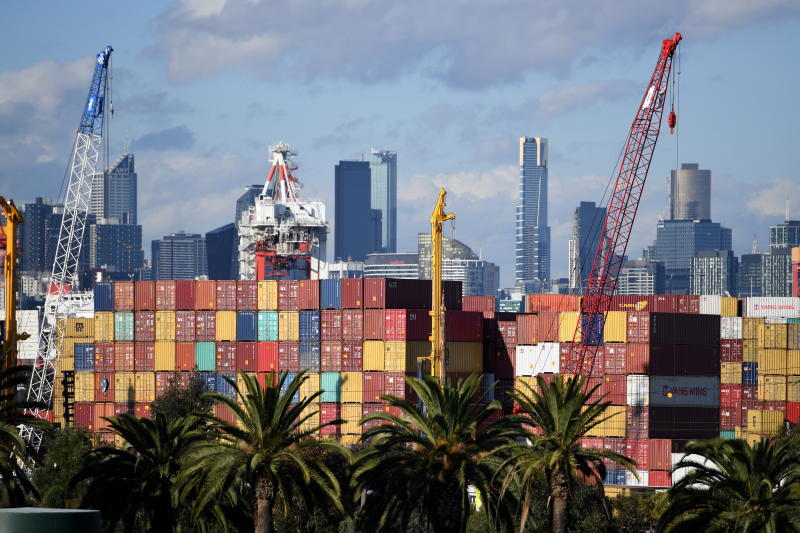News analysis
Australia fears fallout from US-China trade war
Sign up now: Get insights on Asia's fast-moving developments

Australia's economy is more dependent on China than any other developed nation which makes it highly susceptible to the fallout from the trade dispute between Beijing and Washington.
PHOTO: EPA-EFE
Follow topic:
SYDNEY - The trade war between China and the United States could have a devastating impact on Australia, leading to calls for the country to broaden its range of trading partners.
Australia's economy is more dependent on China than any other developed nation which makes it highly susceptible to the fallout from the trade dispute between Beijing and Washington.
In 2016-17, trade with China was worth A$174.7 billion (S$172.2b), or 24 per cent of Australia's entire trade. The next biggest trading partners were Japan, with trade worth A$68.6 billion, and the United States at A$66.5 billion. Singapore was in eighth place, with trade worth A$24.7 billion.
An analysis by auditing firm KPMG found that an all-out trade war - in which all countries hiked tariffs - would be "extremely serious", costing Australia A$500 billion over a decade as well as 60,000 jobs. But it found that even a limited trade war, restricted to currently announced tariffs, would cause Australia's gross domestic product to decrease by 0.3 per cent after five years. Total losses over this period would be A$36 billion.
"Australia and other nations should resist pressure to impose or increase tariffs on goods imported from the US and China, since doing so would do much more harm than good to their own economies," the firm said in a report.
Australia's central bank, the Reserve Bank, has also expressed concern about the impact of a trade war. In the minutes from its latest board meeting this month, the RBA said it was worried about potential fallout from the ongoing tariff hikes.
"Members observed that there were still significant tensions around global trade policy and that this represented a material risk to the outlook," the minutes stated.
China's thirst for resources - along with booming numbers of Chinese tourists and international students - have helped Australia enjoy 27 years of continuous economic growth, more than any other developed nation.
Australia, whose closest ally is the United States, tends to avoid outright criticism of Washington but has vociferously condemned President Donald Trump's imposition of tariffs on China and other nations.
The Trade Minister, Mr Simon Birmingham, said he was worried about the tariffs and recent attempts by Washington to disrupt the traditional rules of global free trade.
"We urge all nations to continue to respect, abide by what are now-long established international rules in relation to the way trade occurs," he told ABC Radio on Wednesday.
"We're deeply disappointed by the fact that the US administration has applied unilaterally tariff measures that go against those established rules, just as we are concerned by actions of other countries in terms of industrial subsidies that they might apply in different ways."
Reacting to the developments, the Business Council of Australia, which represents business leaders, said Australia should find a more diverse range of trading partners and look to boost trade with India, Europe and Britain.
"(The Federal Government needs) to make our economy more resilient, and less vulnerable to global changes," the council's chief executive, Ms Jennifer Westacott, told ABC News.
"Obviously, business is anxious about where this might end up."
But some sectors in Australia could potentially benefit from a limited trade war.
China's Vice-Commerce Minister, Mr Wang Shouwen, said this week that China would consider reducing imports of liquefied natural gas from the United States and instead increase supply from Australia.
The United States, Australia and Qatar are the world's largest suppliers of LNG and together will account for 60 per cent of global supplies by 2023.
"The US is a major supplier of LNG to China, but because of its trade restriction measures, China is compelled to adopt counter-measures," Mr Wang was quoted as saying in The Australian daily.
"Australia is an important source of China's LNG. The trading between China and Australia in LNG is pretty sizeable and there is huge potential," he added.
Some analysts have also suggested that China may proceed with plans to cut tariffs for other countries, which could deliver a significant boost to Australia's agriculture sector, particularly grain growers.
"Should China make good on this policy it would present opportunities for Australian agribusinesses," Mr Tobin Gorey, a Commonwealth Bank analyst, told the Farm Online website.
"Pricing advantages might open up, at least against US competitors for various grain crops… The game in this context is to take advantage of opportunities as they arise but not to get invested in an irreversible way," he added.

